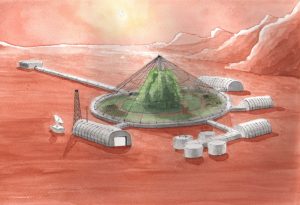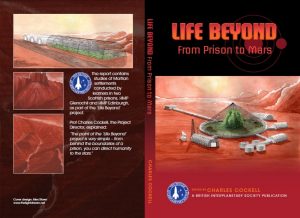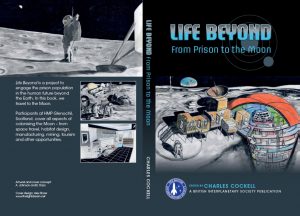In this guest blog, Charles Cockell talks about ‘Life Beyond’, the prison-university project he founded which encourages prisoners to think creatively about the challenges – practical, physiological and societal – of living on another planet.
The prospect of humans exploring and settling the ‘final frontier’, as the crew of a well-known spaceship once called it, is a thrilling one. Even if you are not a great enthusiast for the rocky extremes of the Moon and Mars, and have no desire to live or even visit these places, there is no denying that these desolate and far-away places offer an open book to the imagination. One can design stations for human settlers, write imaginary diaries about their daring-do expeditions or even write music about their future exploits.
With these ideas in mind, in 2016 we established a collaboration with the Scottish Prison Service (SPS) and Fife College to use the space frontier as a vehicle to offer prisoners the opportunity to help humanity settle space. Life Beyond is not just about providing an educational opportunity.
As there is no one yet living in space, the ‘right’ way to go about making this a success is anyone’s guess – all ideas are potentially valid… anyone, from any background, can potentially throw some useful ideas into the ring
It is about getting prisoners to engage in the thrill of original research. As there is no one yet living in space, the ‘right’ way to go about making this a success is anyone’s guess – all ideas are potentially valid. This simple principle means that anyone, from any background, can potentially throw some useful ideas into the ring. The first book our prisoners wrote, Life Beyond: From Prison to Mars, which we published jointly with the British Interplanetary Society, ended by being read by multiple European astronauts at the European Space Agency (ESA). They even sent a signed copy back to HMP Glenochil with words of encouragement and approval. Since then, Life Beyond has been cited by EuroPris as an example of best practice in European prison education and our participants have won Koestler Awards for their work.
Elysium Station, Mars. A Mars station designed by Life Beyond participants at HMP Glenochil.

Elysium station, Mars, designed by prisoners at HMP Glenochil
So how does this work? We start our first session getting participants to think about the challenges of living on the Moon or Mars. It is dusty, there is no oxygen, water is difficult to come by, and the radiation levels are high. By thinking about the challenges, the participants are not only learning some interesting science, but they are setting themselves up for the second session when they must consider the basic needs to survive in these places. If you want to eat, for example, then you’ll need a food module. To breathe, you’ll need an oxygen-producing module. In the second week, they start to form small subgroups among the 15 or so participants that take part. Depending on their interest, some may focus on station design, others on art. In the first iteration of Life Beyond at HMP Glenochil, two participants produced a wonderful compilation of Martian Blues music.
We even had a group write a 200-year fictional time line of life on Earth and Mars, a piece of imaginative writing that would have done HG Wells proud
After the second session, we take a break for a few weeks. Participants use this time to work individually and as a group in their respective learning centres to design their lunar or Martian stations before we reconvene in the third session. Now they have a station, they need to do something there. In this third session, each individual participant must come up with an artefact of exploration. It could be a diary of an expedition, a space tourism poster for the station; we even had a group write a 200-year fictional time line of life on Earth and Mars, a piece of imaginative writing that would have done HG Wells proud. In this session, we kicked off other activities such as a prison-wide voluntary writing competition where entrants had to write, in less than 500 words, their first email home from Mars, bringing in a range of exciting and imaginative essays and poems.
From Prison to Mars, a book published by participants of the Life Beyond project.

From Prison to Mars, a book published by participants of the Life Beyond project
In the final week, we transition to the last part of the design – considering social arrangements in space. Who will govern? How will laws work? How will law enforcement work? In a slightly superficial, but not inconsequential, way, prisons have some similarities with planetary stations. On the Moon and Mars, people will be largely confined to the stations, they will have little contact with people outside, and there will be high levels of interdependence between the population. Participants can draw upon their own experiences in prison to think about how we might successful establish these distant populations, and while doing this, consider matters of civic responsibility, democracy, and so forth.
Life Beyond was always about demonstrating to participants that education is not only potentially great fun, but with a little knowledge, you can make a significant contribution quite quickly.
 Life Beyond was always about demonstrating to participants that education is not only potentially great fun, but with a little knowledge, you can make a significant contribution quite quickly. The second book we have published, Life Beyond: From Prison to the Moon presents the first long-term strategy for the human exploration and settlement of the Moon to be developed by prisoners. Both of our books have been sent to space agency libraries and other organisations and we hope will inspire ideas and suggestions on how to successfully settle space.
Life Beyond was always about demonstrating to participants that education is not only potentially great fun, but with a little knowledge, you can make a significant contribution quite quickly. The second book we have published, Life Beyond: From Prison to the Moon presents the first long-term strategy for the human exploration and settlement of the Moon to be developed by prisoners. Both of our books have been sent to space agency libraries and other organisations and we hope will inspire ideas and suggestions on how to successfully settle space.
From Prison to the Moon, a book published by participants of the Life Beyond project.
We want to continue this course in Scotland, but find ways to make it useful in the rest of the UK and internationally, and are working with Prisoners’ Education Trust to do this. One concept we are considering is to build a set of course materials that can be taken up by individual prisoners. They could focus on one part of space exploration, drawing pictures, writing ideas or going in any direction they choose. They would submit these materials to us and periodically we would publish a book on space exploration and settlement design, collecting concepts from across the prison system in the UK and internationally.
We also hope that Life Beyond is a helpful example of the paradigm of bringing out the best in people and channelling human energies, whether in prison or elsewhere, toward a productive and positive future
We have been extremely fortunate to have the support of the Scottish Prison Service (SPS), Fife College and the staff of the prison learning centres who have embraced this project and helped to make it a success. Our ability to implement it has largely been made possible by the enlightened and forward thinking culture on education at the SPS. We also hope that Life Beyond is a helpful example of the paradigm of bringing out the best in people and channelling human energies, whether in prison or elsewhere, toward a productive and positive future. As a species, we have many serious, yet energising, challenges ahead of us. There is no segment of the human population that needs to be left behind in opening up these thrilling vistas – and there is potentially a lot of good we can do by bringing everyone with us.
This is part of the Prison University partnerships blog series, which shines a spotlight each month on an example of prisons and universities working in partnership to deliver education. If you would like to respond to the points and issues raised in this blog, or to contribute to the blog yourself, please contact Helena.